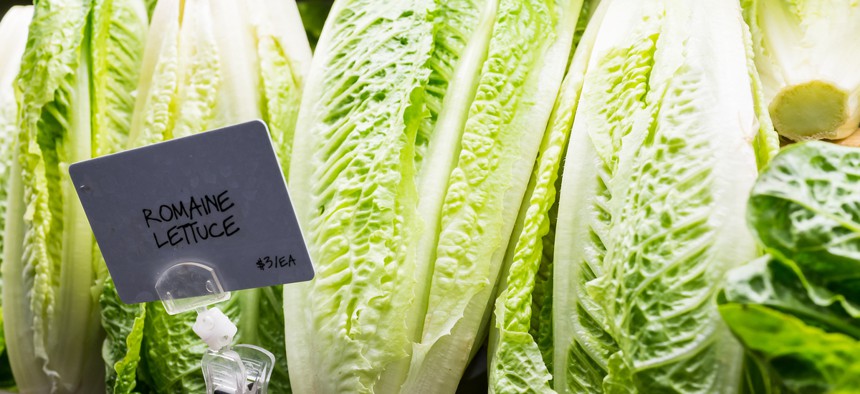
Last year's E. coli contamination was largely due to tainted romaine lettuce. Kristi Blokhin/Shutterstock.com
Shutdown Roundup: Fewer Food Inspections, Tips For Furloughed Feds to Make Ends Meet and the Future of SNAP Benefits
The safety of the food system has been placed at risk by the shutdown.
The partial shutdown continues and more than 800,000 public servants are affected throughout the government. This week, the employee-assistance arm of the Coast Guard published a tip sheet entitled "Managing Your Finances During a Furlough," with suggestions on how to make ends meet or make money stretch further. The Washington Post first reported on the document, which tells Coast Guard employees that "bankruptcy is a last option." The document also gives suggestions for ways to raise funds, including holding garage sales, looking for babysitting jobs or that feds could "Turn your hobby into income." The tip sheet has suggestions on how to talk to creditors, as well, and for budgeting. Read more at The Washington Post or read the tip sheet.
Congress has only approved the Supplemental Nutrition Assistance Program—colloquially known as food stamps—until the end of January, but the Trump administration announced this week that the government will move money around or take steps to fund SNAP for the immediate future, according to our sibling site Route Fifty. "We're committed to maintaining service to SNAP clients without interruption to the extent possible under the law," an Agriculture Department official said during a conference all with reporters. Read more at Route Fifty.
Federal office buildings in the District of Columbia get their water through DC Water, but the largest employer in D.C. will not be paying $5 million of its $16.5 million quarterly water bill, according to DCist. At the D.C. water authority's first meeting of the year, DC Water board chairman Tommy Wells asked: “Is there a time from nonpayment when we cut someone’s water off?” Another board member joked about turning off the White House's water. Under D.C. law, DC Water can shut off water after 30 days of nonpayment. The shutdown would have to continue for two more weeks, but DC Water's CFO said during the meeting that such measures will not be necessary. "Obviously, for things like the General Services Administration for the federal government it’s a slightly different process, because we know they’re good for the money," he said. Read more at DCist.
The Food and Drug Administration—responsible for 80 percent of food inspections in the United States—has furloughed many of its employees due to the partial shutdown, and The Washington Post reported that food inspections are down "sharply" since the shutdown began in December, increasing the risk of food-borne illnesses. FDA Commissioner Scott Gottlieb told the paper that “We are doing what we can to mitigate any risk to consumers through the shutdown,” but food safety advocates say it isn't enough. The furloughs put "our food supply at risk," said Sarah Sorscher, deputy director of regulatory affairs at the Center for Science in the Public Interest. A risk management expert told the paper that dangers will continue as long as federal employees are furloughed. “You’re going to see a much higher risk of a failure in the system,” said Bruce McIndoe, founder and president of WorldAware. Read more at The Washington Post.







